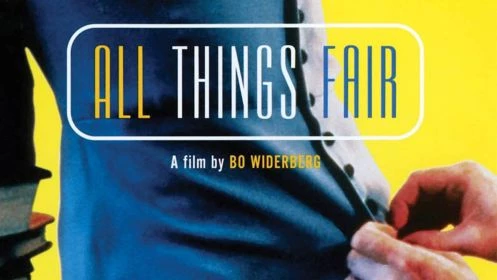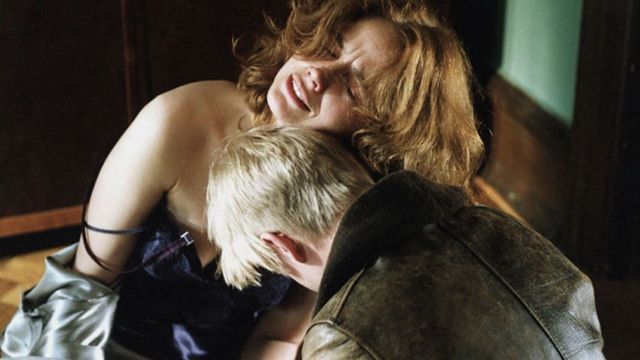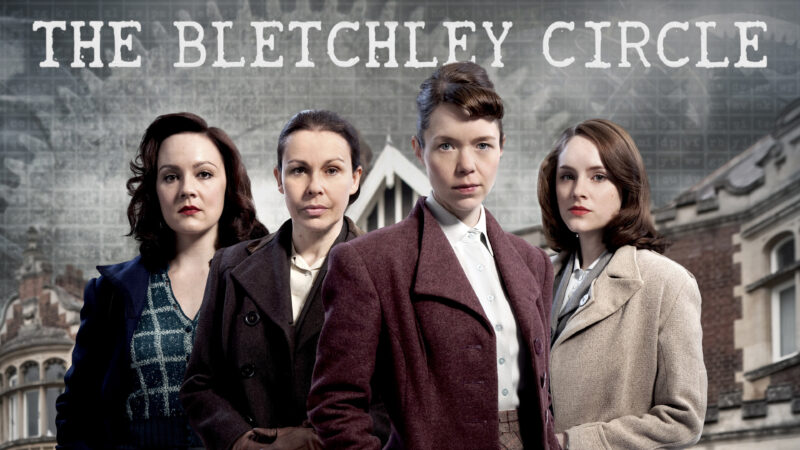🎬 𝑨𝒍𝒍 𝑻𝒉𝒊𝒏𝒈𝒔 𝑭𝒂𝒊𝒓 (1995)

All Things Fair: A Ballad of Love Under the Glow of War

In the treasure trove of Swedish cinema, All Things Fair (1995) stands out as a gem both bold and profound, weaving a tale of forbidden love between a 15-year-old student and his 37-year-old teacher in 1943 Malmö. Directed by Bo Widerberg, the film is an intense emotional journey, exploring desire, innocence, and the fragile boundaries of morality. With captivating performances by Johan Widerberg and Marika Lagercrantz, All Things Fair is not just a love story but a delicate portrait of coming-of-age and the cost of passion. This haunting cinematic work leaves an indelible mark, lingering in the hearts of its audience.
A Perilous Romance
All Things Fair transports viewers to Malmö, Sweden, in 1943, where World War II casts a subtle shadow through air raid drills and wartime scarcity. Stig (Johan Widerberg), a 15-year-old boy from a working-class family, is navigating the turbulence of adolescence. At school, he becomes entranced by Viola (Marika Lagercrantz), his 37-year-old biology teacher, a radiant woman harboring a deep well of sorrow. Viola is trapped in a cold marriage to Kjell (Tomas von Brömssen), a lingerie salesman addicted to alcohol, with a passion for classical music but emotionally distant.

From exchanged glances in the classroom, Stig and Viola fall into a secret romance, both fervent and fraught with risk. Their relationship is a blend of Stig’s youthful longing and Viola’s loneliness, but the age gap and her position as his teacher create an inescapable power imbalance. Their intimate moments, portrayed with authenticity and sensuality, highlight both the closeness and the peril of their love. Yet, as Kjell grows suspicious, driven by liquor and jealousy, and Stig’s classmates, like Sigge, notice his changed demeanor, their bond becomes increasingly fragile.
The arrival of Lisbet (Karin Huldt), a girl Stig’s age, complicates his emotions, offering a contrast between innocent young love and the forbidden passion with Viola. Meanwhile, Viola grapples with guilt and the realization that their affair cannot endure. The film guides viewers to a bittersweet conclusion, where Stig shifts from infatuation to disillusionment, and Viola wrestles with her inner wounds. All Things Fair is a story of love, maturity, and the price paid when the heart crosses societal boundaries.
Refined Cinematic Artistry
Bo Widerberg, one of Sweden’s finest filmmakers, crafted All Things Fair as his final work, leaving a lasting cinematic legacy before his passing in 1997. The film bears his naturalistic style, influenced by the French New Wave, with a focus on raw emotion and poetic visuals. Drawing inspiration from his own youthful infatuation with a teacher, Widerberg imbues Stig’s story with a special sincerity.

Morten Bruus’ cinematography is a highlight, using soft lighting and close-up shots to recreate wartime Malmö. From stifling classrooms to quiet streets, the imagery is both intimate and somber, mirroring the characters’ inner lives. The soundtrack, featuring classical pieces like Beethoven’s Moonlight Sonata, not only underscores Kjell’s character but also amplifies the emotional depth, intertwining with the rhythms of love and loss.
The performances are the heart of All Things Fair. Johan Widerberg, Bo’s son, brings a vibrant Stig to life, both naive and intense, capturing the transition from a dreamy boy to a young man facing harsh realities. Marika Lagercrantz, as Viola, shines with the complexity of a woman torn between desire and morality, both alluring and vulnerable. Tomas von Brömssen portrays Kjell with finesse, transforming a potentially one-dimensional alcoholic husband into a tragic figure, with moments of fragility and a love for music adding depth. The chemistry between the actors, particularly Johan Widerberg and Lagercrantz, drives the narrative, making every glance and gesture profoundly meaningful.
Cultural Significance and Reception
Premiering in Sweden on November 3, 1995, and in the U.S. in March 1996, All Things Fair swiftly garnered critical acclaim. With a 90% rating on Rotten Tomatoes (based on 10 reviews), the film was praised for its emotional authenticity and stellar performances. Critic Roger Ebert awarded it 3.5/4 stars, calling it “tender and true,” highlighting Widerberg’s ability to focus on the human cost of the relationship. Variety described it as “superbly acted and exquisitely crafted,” though some noted its 130-minute runtime might feel protracted for modern audiences.
All Things Fair was Sweden’s official submission for the Best Foreign Language Film at the 1996 Academy Awards and won the Special Jury Prize at the Berlin International Film Festival. The film is a milestone in Swedish cinema, showcasing Widerberg’s talent for challenging social norms. Set during Sweden’s neutrality in World War II, it uses the war as a subtle backdrop, amplifying the characters’ inner conflicts.

The theme of a teacher-student romance, though handled with sensitivity, remains controversial, particularly in today’s context with heightened awareness of power dynamics and consent. X posts in 2025 reveal audiences rediscovering the film on streaming platforms, lauding its “haunting beauty” and “bold storytelling,” though some caution that its sensitive scenes and age gap may unsettle certain viewers.
Legacy and Where to Watch
As of May 28, 2025, All Things Fair is available on select streaming platforms like Kanopy or Amazon Prime (region-dependent) or can be purchased on DVD through specialty retailers. The DVD includes English subtitles but lacks extensive bonus content. Viewers are encouraged to use legal platforms to support the film’s legacy and avoid illicit sources.
All Things Fair is more than a forbidden love story; it is a profound exploration of coming-of-age, temptation, and the moral boundaries tested by desire. As Bo Widerberg’s final work, it testifies to cinema’s power to question human nature. With its poetic visuals, authentic performances, and a heart-wrenching conclusion, All Things Fair invites viewers to confront the gray shades of love.
Conclusion
All Things Fair (1995) is a Swedish cinematic masterpiece, narrating the tragic romance between Stig and Viola in 1943 Malmö. Directed by Bo Widerberg, with outstanding performances by Johan Widerberg and Marika Lagercrantz, the film delves into desire, innocence, and the cost of crossing ethical lines. Available on select streaming services and DVD, All Things Fair is a beautiful and heartbreaking tale that leaves an unforgettable imprint. If you’re ready for an emotional journey where love and morality collide, let All Things Fair guide you into its world. 💔🌌





